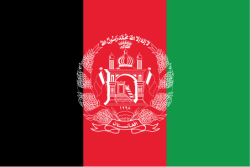“Hey, who are you?” The straightforward question came to me in my first day as a high school student in America.
I was about to begin the biography-like chronicle of my life, as I would when I was back in Afghanistan, when it hit me. Who was I, indeed?
It was then that I truly realized I no longer lived in Afghanistan, where I was Abuzar Royesh, a moderately well-known student in one of the best high schools in Kabul. At that moment all the adjectives I would normally use to describe myself felt hollow and empty. Who cared what my name was or how popular I was back in Afghanistan?
I realized that the farther I got from Afghanistan, the more pieces of my identity fell away. Here in the U.S. I no longer was a Hazara, a tag that distinguished me from the people of other ethnicities, a Ghaznichi (from Ghazni Province), as the inhabitants of other provinces would identify me. My most important piece of identity was not even "Abuzar Royesh," the birth name my parents chose to for me.
Here in the U.S. I was first and foremost an Afghan: a title that conjured up Taliban and al Qaeda, war, killings, and explosions.
Cough. I cleared my throat, “I am Abuzar. I am an exchange student from Afghanistan…” Before I finished my sentence I could already see the astonishment in his eyes.
“Wow! So cool. How did you make it here?”
I started to explain my story. But just as I began the entire monologue I had memorized in response to this question, he spurted out the next one.
“What is life like in Afghanistan?”
I now attempted to answer this question. Again, before I could get my words out, further questions started showering me incessantly. I couldn’t understand his thirst for interrogating me about Afghanistan. Having lived all of my life in Afghanistan and Pakistan, to me Afghanistan was merely a country; a homeland, just like all others. I felt as ordinary in my country as any kid from the U.S. or France would feel in theirs.
But seemingly this wasn’t what he thought of my country. As I would learn later on, to him and many other Americans, Afghanistan was just a remote land where thousands of American soldiers sacrificed their lives in a doomed attempt to bring democracy and stability, and where billions of American dollars had vanished. They were apparently startled to meet someone actually from there; someone who had a different story from what they knew.
From that moment on, the identity I had previously forged for myself was overtaken by a new definition of me: “Afghan.” On the first day of my academic year in the U.S., when the emcee called out the six international students’ names and their respective countries, I saw how all eyes fixed on me when my country’s name was called. Wherever I went or whatever I did, I bore the Afghan tag. I had now become the avatar of my country, and I realized that whatever I said and whatever I did, I was helping create my classmates’ perception of what an Afghan person is.
I carried with me Afghanistan’s long history of civil wars, Afghans’ presumed hatred towards the United States, and corrupt and despotic governments, though I was responsible for none of it.
But I could show them that Afghanistan is a normal country, just like the U.S. Youth in Afghanistan also have their hopes and ambitions, they also seek time for relaxation, they enjoy wearing the latest fashion, playing videogames, and having access to latest technologies. To create this new image, I had to choose each of my moves very vigilantly; a minor slip and I could annihilate this new depiction of “normal” Afghanistan I strived to sketch.
When I came to school in jeans, a t-shirt, and basketball shoes, I realized, in my classmates’ minds all Afghans dressed in the same fashion. The food on my plate or the drink in my cup became recipes for how an Afghan would eat. Every “A” I acquired in my classes earned Afghanistan an “A,” and I felt that my failures and the things I didn’t know became testaments to Afghanistan’s ignorance.
This new role brought with it conflicting emotions. In many ways it deprived me of the prospect to be an ordinary kid, like all the other students I would regularly see in my classes. At times, I confess, I envied some of my classmates’ courage to blow off studying or doing homework, while I had to always appear diligent and motivated.
When my high school friends went to parties and theaters, or played videogames, I had to do community service or give presentations about my country as part of my exchange program. I still remember that my high school prom was at the same time as a workshop by the exchange program about our return to Afghanistan.
And while other students could be callous about what happened in the world around them, I had to be able to analyze and discuss what was going on not only in Afghanistan, but also in the Middle East and other parts of the world.
I was a person their age sharing most of their urges, needs, and desires; why did I alone have to shoulder this extra responsibility?
Sometimes I would try to hide my Afghan identity by presenting my student ID instead of my passport in the airports or by struggling to adjust my accent when shopping or talking to strangers; all this to evade the questions I was sure would follow once someone learned I was from Afghanistan.
But on the other hand, I felt proud to have substituted the predominant American images of Afghanistan with my own; I had found a voice to cry my generations’ aspirations, wants, and ideologies. I would introduce Afghanistan through the eyes of my generation, a generation tired of the animosity and ignorance that had ruled Afghanistan, endeavoring to make the country a better place.
This pride and joy counterbalanced all the exhaustion I would at times feel. I may have lost pieces of my identity that I had grown accustomed to back home, but I now felt there was more to me than I had previously aspired for.
I was about to begin the biography-like chronicle of my life, as I would when I was back in Afghanistan, when it hit me. Who was I, indeed?
It was then that I truly realized I no longer lived in Afghanistan, where I was Abuzar Royesh, a moderately well-known student in one of the best high schools in Kabul. At that moment all the adjectives I would normally use to describe myself felt hollow and empty. Who cared what my name was or how popular I was back in Afghanistan?
I realized that the farther I got from Afghanistan, the more pieces of my identity fell away. Here in the U.S. I no longer was a Hazara, a tag that distinguished me from the people of other ethnicities, a Ghaznichi (from Ghazni Province), as the inhabitants of other provinces would identify me. My most important piece of identity was not even "Abuzar Royesh," the birth name my parents chose to for me.
Here in the U.S. I was first and foremost an Afghan: a title that conjured up Taliban and al Qaeda, war, killings, and explosions.
Cough. I cleared my throat, “I am Abuzar. I am an exchange student from Afghanistan…” Before I finished my sentence I could already see the astonishment in his eyes.
“Wow! So cool. How did you make it here?”
I started to explain my story. But just as I began the entire monologue I had memorized in response to this question, he spurted out the next one.
“What is life like in Afghanistan?”
I now attempted to answer this question. Again, before I could get my words out, further questions started showering me incessantly. I couldn’t understand his thirst for interrogating me about Afghanistan. Having lived all of my life in Afghanistan and Pakistan, to me Afghanistan was merely a country; a homeland, just like all others. I felt as ordinary in my country as any kid from the U.S. or France would feel in theirs.
But seemingly this wasn’t what he thought of my country. As I would learn later on, to him and many other Americans, Afghanistan was just a remote land where thousands of American soldiers sacrificed their lives in a doomed attempt to bring democracy and stability, and where billions of American dollars had vanished. They were apparently startled to meet someone actually from there; someone who had a different story from what they knew.
From that moment on, the identity I had previously forged for myself was overtaken by a new definition of me: “Afghan.” On the first day of my academic year in the U.S., when the emcee called out the six international students’ names and their respective countries, I saw how all eyes fixed on me when my country’s name was called. Wherever I went or whatever I did, I bore the Afghan tag. I had now become the avatar of my country, and I realized that whatever I said and whatever I did, I was helping create my classmates’ perception of what an Afghan person is.
I carried with me Afghanistan’s long history of civil wars, Afghans’ presumed hatred towards the United States, and corrupt and despotic governments, though I was responsible for none of it.
But I could show them that Afghanistan is a normal country, just like the U.S. Youth in Afghanistan also have their hopes and ambitions, they also seek time for relaxation, they enjoy wearing the latest fashion, playing videogames, and having access to latest technologies. To create this new image, I had to choose each of my moves very vigilantly; a minor slip and I could annihilate this new depiction of “normal” Afghanistan I strived to sketch.
When I came to school in jeans, a t-shirt, and basketball shoes, I realized, in my classmates’ minds all Afghans dressed in the same fashion. The food on my plate or the drink in my cup became recipes for how an Afghan would eat. Every “A” I acquired in my classes earned Afghanistan an “A,” and I felt that my failures and the things I didn’t know became testaments to Afghanistan’s ignorance.
This new role brought with it conflicting emotions. In many ways it deprived me of the prospect to be an ordinary kid, like all the other students I would regularly see in my classes. At times, I confess, I envied some of my classmates’ courage to blow off studying or doing homework, while I had to always appear diligent and motivated.
When my high school friends went to parties and theaters, or played videogames, I had to do community service or give presentations about my country as part of my exchange program. I still remember that my high school prom was at the same time as a workshop by the exchange program about our return to Afghanistan.
And while other students could be callous about what happened in the world around them, I had to be able to analyze and discuss what was going on not only in Afghanistan, but also in the Middle East and other parts of the world.
I was a person their age sharing most of their urges, needs, and desires; why did I alone have to shoulder this extra responsibility?
Sometimes I would try to hide my Afghan identity by presenting my student ID instead of my passport in the airports or by struggling to adjust my accent when shopping or talking to strangers; all this to evade the questions I was sure would follow once someone learned I was from Afghanistan.
But on the other hand, I felt proud to have substituted the predominant American images of Afghanistan with my own; I had found a voice to cry my generations’ aspirations, wants, and ideologies. I would introduce Afghanistan through the eyes of my generation, a generation tired of the animosity and ignorance that had ruled Afghanistan, endeavoring to make the country a better place.
This pride and joy counterbalanced all the exhaustion I would at times feel. I may have lost pieces of my identity that I had grown accustomed to back home, but I now felt there was more to me than I had previously aspired for.






